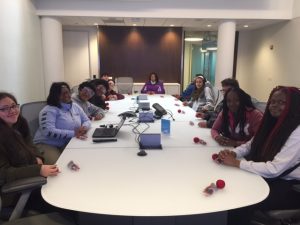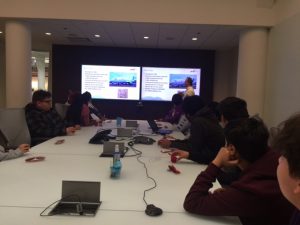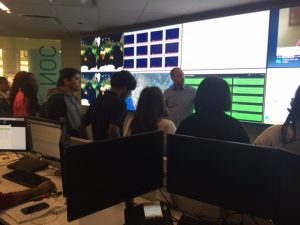Futures Taking Flight at GoGo Air
Chicago Tech Academy High School is showing students that there are more career options than they could have imagined. Through a re-imagined partnership with GoGo Air, an in-flight internet provider, the organizations have just completed the first full semester of Project Jumpseat. The program addresses the need to expose young ladies and students of color to careers in STEM and related fields, ultimately expanding their horizons.
 Project Jumpseat started as a kind of accident. While Chicago Tech had collaborated with GoGo Air before through other programs as a part of the school’s Real World Learning initiative, GoGo Air’s senior director of information management and leader on Project Jumpseat, John Wicklein, stumbled on Chicago Tech while searching for ways to get more involved in the community.
Project Jumpseat started as a kind of accident. While Chicago Tech had collaborated with GoGo Air before through other programs as a part of the school’s Real World Learning initiative, GoGo Air’s senior director of information management and leader on Project Jumpseat, John Wicklein, stumbled on Chicago Tech while searching for ways to get more involved in the community.
“When I looked at my team, we were under represented with women or people of color. We didn’t have any open positions, but I wanted to do something that would be a long term solution. I searched around, and that’s when I found ChiTech,” Wicklein says.
The school’s mission to educate, empower, and connect students from underserved communities to successful careers in tech and entrepreneurship made them a perfect match.
Chicago Tech’s executive director Kelly Jones was excited about the prospect of providing a revamped opportunity to students.
“We just said yes to everything that John and the GoGo Air team pitched. As a result, our young women and men had the opportunity of a lifetime. We all learned a lot and it’s been a blast. We’re looking forward to the fall kick-off of Project Jumpseat,” Jones said.
Planning Stages
Wicklein, Jones, and ChiTech’s Real World Learning manager TJ Pavlov set up an initial meeting at the school, and GoGo’s team saw the magic happening in the four walls. They talked logistics and held weekly meetings in preparation for the launch of the initiative. But they had a few obstacles to consider.
“[Pavlov and Jones] informed us that not all the students wanted to be involved in STEM. Some of them are at the school because it’s an alternative to their home schools,” Wicklein said. Getting students who weren’t necessarily interested in STEM careers might be a challenge.
Wicklein and his team decided the four-hour workshops making up Project Jumpseat would have to include a range of careers. Among the STEM careers, Wicklein brought in front end developers, HR professionals, information management specialists (his forte), and creative marketing professionals.
“We told the kids about our jobs, the paths we took, and how we got here. We wanted to show them there’s no one way to do things,” Wicklein said.
Who’s To Blame?
According to a 2015 Fortune study on demographics in 14 tech companies showed that at tech giants like Google, Facebook and Microsoft, women comprise about one-third of the workforce. Those numbers were slightly more equal for non-white employees.
Research has proven that companies have seen boosts in equity, retention, acquisition and overall production by hiring a more inclusive pool of workers. It’s not rocket science: different backgrounds give different perspectives on how to improve a business or product, leading to innovation, better work/life satisfaction for employees, better retention, and in the end, more money, meaning happier stakeholders. It’s business 101. And yet, there are still massive gaps in inclusion in STEM careers.
Many have speculated that this could be a pipeline problem. It’s part of the reason ChiTech exists: to address the lack of diversity in the tech pipeline. But Wicklein says it’s not just providing opportunities to young people that will solve the issue. Companies need to be held accountable as well.
“Often, hiring managers in tech will wash their hands and say there’s nothing they can do since they only look at the resumes HR gives them,” Wicklein said. “We need everyone to speak up, and to address the issue on many levels. I hope Project Jumpseat is one way to do that.”
Helping Futures Take Flight at GoGo Air
 ChiTech sent the first round of students this past spring semester. 15 sophomores participated in the initial program. It’s not always easy to ignite 14- and 15-year-olds, and Wicklein says he’s happy stereotypes didn’t get in the way.
ChiTech sent the first round of students this past spring semester. 15 sophomores participated in the initial program. It’s not always easy to ignite 14- and 15-year-olds, and Wicklein says he’s happy stereotypes didn’t get in the way.
“They’re normal teenagers. A lot of the students were engaged and asked insightful questions. They were eager to learn,” he said.
It helps that the HR team told the students about the positives of having a full time job with benefits.
“We told them the truth. You study hard, go to school and get a job in tech, you’ll like be making $70,000 to start. It blew their minds,” Wicklein said.
GoGo Air and ChiTech will continue their partnership for the foreseeable future, making the program span to both semesters and include freshmen. To maintain those long term connections that emerge from the program, GoGo and ChiTech are building out an alumni network on LinkedIn, so current and past participants of the program can stay in touch as they move through their careers, potentially providing more opportunities in the future.
“This is an amazing opportunity to get kids thinking about how they can get out into the world, and ultimately make it a bit less scary for them too,” TJ Pavlov, ChiTech’s Real World Learning manager, said.
It’s a worthy cause, and getting students out into the real world sooner can open their eyes to bigger and better things.
“At the end of the day, the goal wasn’t to teach the kids SQL or management, though those skills have value. The primary goal is to expand their horizons and have them realize they can do this, these career options are for them, and for us to help guide them through that process throughout their high school career,” Wicklein said.
To learn more about ChiTech’s Real World Learning program and STEM curriculum, please visit our website or contact Kelly Jones, Executive Director for Community Engagement at kjones@chicagotechacademy.org.


